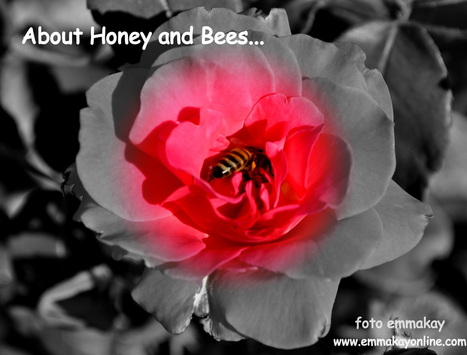At the risk of throwing the cat among the pigeons, I've come to the conclusion that for me honey is totally acceptable and not strictly speaking a pure animal product since it is in fact the result of the busy bees' hard work and a chemical process that takes place when the bees ingest the nectar from flowers and then subsequently regurgitate it in the form of honey. As far as I have been able to check, natural bee honey does not contain animal proteins which was THE most important factor for our conversion to veganism. Also, in my book beekeepers actually are some kind of Guardians of the Planet in so far that they provide a pretty safe environment for the bees to form much-needed colonies. I do admit that the question is obviously more complex than this, but I can live comfortably with the fact that honey will remain part of my food intake.
Without bees there would be no pollination. No pollination will invariably result in disappearing crops, and with a world population projected to reach 7.5 to 10.5 billion people by 2050, I somehow doubt Mother Earth will be able to feed her children if crops disappear, which they would do without pollination.
Apart from being my personal sugar substitute good quality honey has a variety of health benefits ranging from being an antimicrobial agent and antioxidant to boosting the body's immune system and keeping free radicals in check. (for additional info on the subject CLICK HERE).
Googling the question "Is Honey Vegan?" resulted in my finding an interesting article written on the subject ~ it highlighted several areas I hadn't even considered in my personal decision-making process...
Keith Akers of www.compassionatespirit.com touches a number of issues in the article that are closely linked to the entire Vegan question, and after reading it all I can say is as far as I'm concerned Honey Stays!
Here's an extract of the article in question for your information:
...
+++quote+++
Bees As Pollinators
There’s another significant issue concerning bees, and that is their role as pollinators. Domestically managed bee colonies have dropped by half since 1945. Feral honeybees have essentially disappeared in the United States. The value of bee pollination for both humans and wildlife is hard to quantify but is probably immense. One-third of U. S. crops depend on pollinators; some plants on the endangered species list are endangered precisely because they lack pollinators.
Beekeepers now migrate from place to place in the country performing pollination services for farmers, which helps human food supply but masks the impact of the decline of honeybees on wild plants (and the animals which depend on the plants). Beekeepers may make just as much or more money from pollination services as from selling honey. One emerging practice among hobbyist beekeepers is "top bar" hives, which produce much less honey but also requires much less disturbance (and killing) of bees.
In any event, the use of bees as pollinators raises a significant problem for those objecting to honey on the grounds that bee-keeping kills insects. To be consistent, one would also need to object to all bee-keeping, and then how are we going to pollinate our crops, and how are wild plants on which wild animals depend going to be pollinated?
Of course, this is not to say that a consistent point of view attacking both honey and bee-keeping couldn’t be defended. It’s crop monocultures, bioinvasions, and pesticide use that have led to the decline of wild honeybees -- not vegans boycotting honey. But this raises a whole series of new issues which are not easily addressed. Does consistent veganism now involve opposition to crop monocultures, restrictions on travel to combat bioinvasions, and worldwide organic standards? If it doesn’t, then how are you going to pollinate your crops, and how are wild plants going to be pollinated? Wouldn’t an abolition of bee-keeping lead to many more deaths of animals and humans than the number of bees inadvertently killed in the practice of bee-keeping? We are getting further and further from the core issue of compassion to animals, and it isn’t even clear that abolishing bee-keeping would be increasing rather than decreasing the total amount of compassion in the world.
+++unquote+++
(CLICK HERE for the entire article)
I have taken the various points highlighted into consideration and confirm that I shall continue to indulge occasionally in the natural bee honey which we are fortunate enough to obtain directly from the beekeepers themselves, safe in the knowledge that it's a pure, healthy and very tasty treat indeed!
Sweet smiles,
Emm :))


 RSS Feed
RSS Feed
